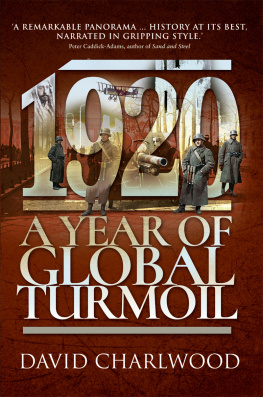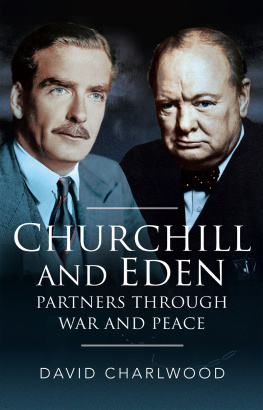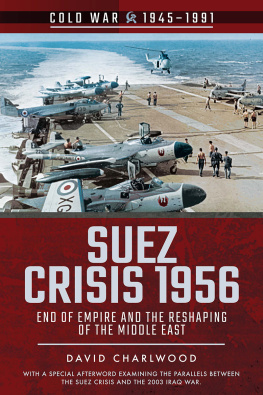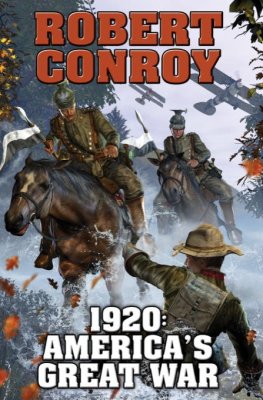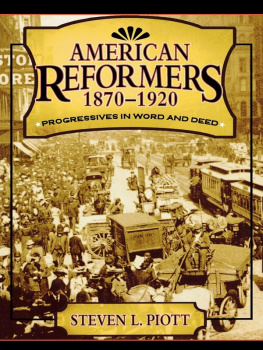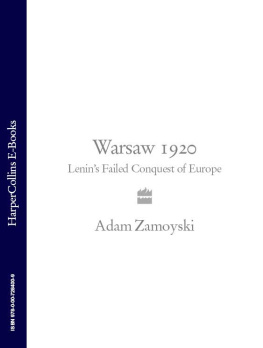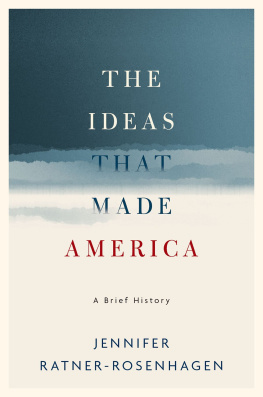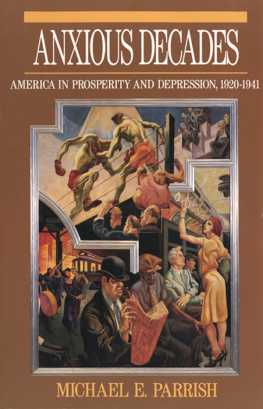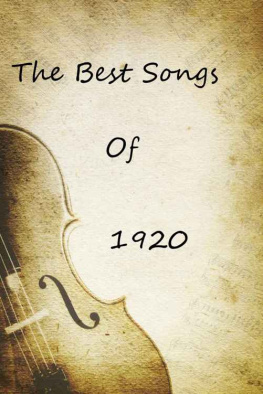Pagebreaks of the print version

1920: A Year of Global Turmoil
1920: A Year of Global Turmoil
David Charlwood
First published in Great Britain in 2019 by
Pen and Sword History
An imprint of
Pen & Sword Books Ltd
Yorkshire - Philadelphia
First published in hardback in 2019, this edition published 2020.
Copyright David Charlwood, 2020
Paperback ISBN: 9781526767172
Paperback eISBN: 9781526729668
Kindle ISBN: 9781526729675
The right of David Charlwood to be identified as Author of this work has been asserted by him in accordance with the Copyright, Designs and Patents Act 1988.
A CIP catalogue record for this book is available from the British Library.
All rights reserved. No part of this book may be reproduced or transmitted in any form or by any means, electronic or mechanical including photocopying, recording or by any information storage and retrieval system, without permission from the Publisher in writing.
Pen & Sword Books Ltd incorporates the Imprints of Pen & Sword Books Archaeology, Atlas, Aviation, Battleground, Discovery, Family History, History, Maritime, Military, Naval, Politics, Railways, Select, Transport, True Crime, Fiction, Frontline Books, Leo Cooper, Praetorian Press, Seaforth Publishing, Wharncliffe and White Owl.
For a complete list of Pen & Sword titles please contact
PEN & SWORD BOOKS LIMITED
47 Church Street, Barnsley, South Yorkshire, S70 2AS, England
E-mail:
Website: www.pen-and-sword.co.uk
or
PEN AND SWORD BOOKS
1950 Lawrence Rd, Havertown, PA 19083, USA
E-mail:
Website: www.penandswordbooks.com
Preface
T he year 1920 was both world-changing and uneventful. For most people, their pressing concerns were the same as ours today: food, shelter, warmth and love. Their world may seem smaller and slower-moving than our own this was a time when crossing the Atlantic was undertaken by boat and took the better part of a working week, when news was only available via radio or newspaper and when most people rarely travelled beyond the borders of their own country but, in reality, there is much in common.
The events of the past have echoes in the present. To speak of a British bombing campaign in Iraq, Russian soldiers annexing countries in Eastern Europe and an American president withdrawing the United States from international peace organisations in order to put America first sounds more like news than history. But the aim of this book is not to draw comparisons, nor divine the future for our current age. It is simply to tell the story of the world one hundred years ago.
There are many books that deal with the social history of the 1920s, but this book takes a global view of events, focusing instead on the wider narrative and the political decisions that had the greatest impact in a single year. It is, therefore, only possible to tell the stories of a few individuals, those who held the reins of power, and to focus on international rather than domestic politics. The story of the year is told chronologically, weaving together the events as they unfolded in different countries. Many of the cast are familiar names Churchill, Hitler, Roosevelt but not as we know them: Winston Churchill has yet to be prime minister, Adolf Hitler is still forging the foundations of the Third Reich, while Franklin D. Roosevelt is working in a desk job for the US Navy. Their stage is a world emerging from the darkness of the first global conflict, as war-ravaged nations winners and losers try and find their feet again. In America, there are the beginnings of a new isolationism, and in Great Britain there is a desperate desire to secure an empire against the expansionism of Communist Russia. Nationalism is on the march and the rulers of distant lands are finding their subjects less inclined to acquiesce quietly to having little say in their own destinies. As the richest country in the world begins a decade of roaring prosperity, the writing is already on the wall. The storm clouds of war and the end of empires are gathering. 1920
PART ONE
Chapter 1
The birth of the new world
O n the morning of 16 January 1920, the newly elected Chairman of the League of Nations addressed its first Council meeting. Arrayed in front of him, beneath the ornate chandeliers of the clock room in the Quai dOrsay in Paris, were representatives of governments from Asia to the Americas. Leon Bourgeois, the neatly-bearded former prime minister of France, began his remarks by acknowledging that the man who had tirelessly campaigned to bring the League into being US President Woodrow Wilson was regrettably absent. Bourgeois then went on to articulate the Leagues great ambition: January 16, 1920 will go down in history as the date of the birth of the new world. Decisions to be reached today will be in the name of all nations together for the first time to substitute right for might.
The main purpose of the League was to stop the world going to war again. Formed at the peace conference in Paris the previous year during the negotiation of the Treaty of Versailles, the League was intended to foster international cooperation and guarantee the political independence and territorial integrity of member states. The organisation comprised an Assembly, where all members were represented, and a Council, headed by five permanent members and four rotating members. The purpose of the Versailles treaty was to prevent Germany from ever starting another war, by enforcing disarmament and requiring Germany to pay reparations, while the League was supposed to provide a mechanism to protect all countries from aggression.
The creation of the League had generated a fair amount of optimism. Europe was only beginning to emerge from the deadliest conflict in its history and there was widespread support for a multinational body to prevent further wars. A popular organisation that sprang up in Britain in support of the Leagues ideals the League of Nations Union encouraged members into signing up by using a heady cocktail of unabashed optimism
An hour and twenty-five minutes after it had begun, the first meeting of the Council of the League of Nations was adjourned. The Council had discussed the single item on the agenda the appointment of a commission to formalise the boundaries of the occupied Saar Basin industrial region in post-war Germany and now it was time for lunch. A seemingly disappointed Leon Bourgeois ended proceedings, noting, Public opinion will perhaps be surprised that we have today made no greater stride and left no deeper mark upon the world.
The only prime minister present at the Council meeting was Eleftherios Venizelos of Greece; other nations sent ambassadors, foreign ministers, or, in the case of Italy, the Minister for Industry. The British prime minister, David Lloyd George, was actually in Paris at the time of the meeting. Rather than attending, he was spending the weekend of his fifty-seventh birthday with his mistress, Frances, as well as dining out and playing golf. Although absent from the first Council meeting, Lloyd George had supported Woodrow Wilson in his desire to found the League at the Paris peace conference in 1919. His motivation was less messianic than that of the American president, however, and Lloyd George had spent much of the conference watching with real joy as Wilson annoyed Frances hard-nosed premier, Georges Clemenceau, with his flights of fancy. Lloyd George later wrote: [Wilsons] most extraordinary outburst was when he was developing some theme I rather think it was connected with the League of Nations which led him to explain the failure of Christianity to achieve its highest ideals Clemenceau slowly opened his dark eyes to their widest dimension and swept them around the Assembly to see how the Christians gathered around the table enjoyed this exposure of the

